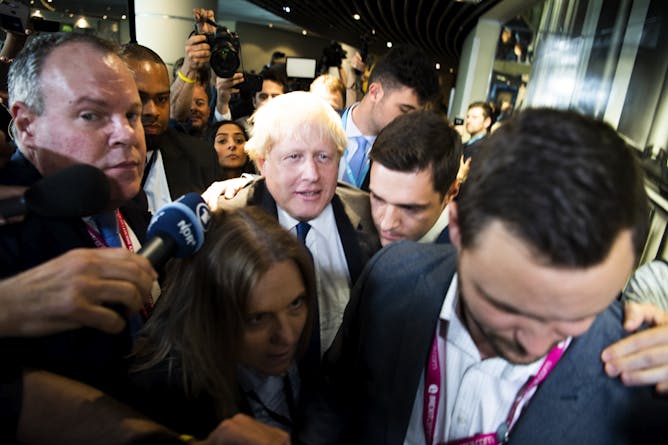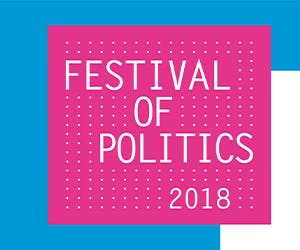|
|
|
Editor's note
|
|
For many international students, a visit to a traditional pub is seen as an essential way of experiencing British culture. But as Thomas Thurnell-Read, Lorraine Brown and Philip Long found out when they asked students to tell them what they encountered, the reality was public vomiting, urination and collapsing in the street. And surprise over how an excessive drinking habit is tolerated and in some cases celebrated by their British
counterparts.
The mood changed dramatically at the Conservative Party conference yesterday as Boris Johnson stopped making snide digs at Theresa May and went for a flat-out impersonation instead. At a packed event, he gave a wide-ranging speech that couldn’t have looked more like a leadership address if he tried. Tim Bale reports from the fringe and explains why Conservative conference 2018 feels like even more of a bubble than usual.
This year’s Nobel Prize in Physics has gone to three pioneers in laser technology. Miles Padgett recalls how his own research was inspired by one of the winners, Arthur Ashkin. Ashkin’s invention of optical tweezers that can trap and move tiny objects with a beam of light have paved the way for a whole new understanding of how biological cells work.
London’s Metropolitan police officers are now allowed visible tattoos. So does that mean inking has lost its rebel mojo? Tattooed professor Ruth Simpson investigates body art’s changing fashion fortunes.
|
Holly Squire
Commissioning Editor
|

|
|
Top stories
|

shutterstock
Thomas Thurnell-Read, Loughborough University; Lorraine Brown, Bournemouth University; Philip Long, Bournemouth University
Public vomiting, urination and collapsing in the street are all things international students don't see at home.
|

h.
Chris Stafford, University of Nottingham
The alleged plan is 'Super Canada'. The real plan is 'Boris for leader'.
|

Maryna Stamatova/Shutterstock
Miles Padgett, University of Glasgow
Using lasers to trap and move particles changed the way we're able to study microscopic life.
|

‘Hurry up! I’m on duty in a minute…’
Shutterstock
Ruth Simpson, Brunel University London
A tattooed professor explains how the unconventional became rather, well, ordinary. Will we now see more on show in the workplace?
|
Science + Technology
|
-
Sophie Darragh, University of Hull
All week I’ve been intrigued and inspired by posters appearing in my department that depict truly great scientists, mathematicians and engineers. Few of them were known to me or my fellow students, yet…
-
Jane Cunneen, Curtin University
Local knowledge and awareness of the risks of tsunamis can better prepare people when disaster strikes.
|
|
Health + Medicine
|
-
Lorenzo Stafford, University of Portsmouth
Smelling odours that aren't there can be annoying. It can also be a sign of a serious underlying condition.
-
Giovanni Biglino, University of Bristol
A bioengineer collaborates with artists, clinicians and patients to come up with an art exhibition with heart.
|
|
Environment + Energy
|
-
Anh Phan, Newcastle University
In the EU, 31% of plastic products go to landfill: but a process called "cold plasma pyrolysis" could turn them into clean fuels.
-
Cristina Santin, Swansea University; Stefan H Doerr, Swansea University
But humans can counteract global warming impacts by creating more fire-resilient societies.
|
|
Arts + Culture
|
-
Martin Hall, York St John University
What is it about Westerns that tempts so many musicians into ten-gallon hats?
-
Kate North, Cardiff Metropolitan University
Take the time to engage with poetry on your own terms.
|
|
Politics + Society
|
-
Tim Bale, Queen Mary University of London
Conservative conference 2018 feels even more of a bubble than usual.
-
Scott Lucas, University of Birmingham; Chris Doucouliagos, Deakin University
By standing in the way of the UN, Russia has chosen a shameful path.
-
Shani Orgad, London School of Economics and Political Science
The Wife: my research shows that this self-sacrificing form of wifehood is hardly history.
|
|
|
|
Cities
|
-
Stephen Parkes, Sheffield Hallam University
The workplace parking levy is a simple idea, but tricky to implement.
|
|
| |
| |
| |
| |

|
| |
| |
| |
Featured events
|

|
Scottish Parliament, Edinburgh, Edinburgh, City of, EH99 1SP, United Kingdom — The Conversation
|

|
Room P/L/002, Physics and Electronics Building, York, York, YO10 5DD, United Kingdom — University of York
|

|
Simon Building, The University of Manchester, Oxford Road, Manchester, Manchester, M13 9PL, United Kingdom — University of Manchester
|

|
Egham Hill, e, Surrey, TW20 0EX, United Kingdom — Royal Holloway
|
|
|
|
| |
| |
| |
| |
| |
|
|
|
|
|
|
|